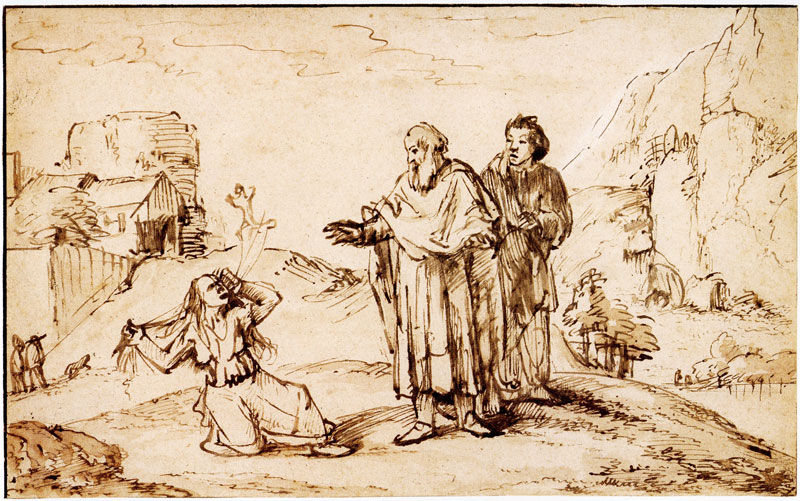A sermon preached at Niles Discovery Church, Fremont, California,
on Sunday, April 7, 2024, by the Rev. Jeffrey Spencer.
Scripture: Acts 16:16-34 and Luke 24:13-25
Copyright © 2024 by Jeffrey S. Spencer
“The Christian faith, while wildly misrepresented in so much of American culture, is really about death and resurrection. It’s about how God continues to reach into the graves we dig for ourselves and pull us out, giving us new life, in ways both dramatic and small.”[1]
That assessment from the Rev. Nadia Bolz-Weber, is, I think, spot on, and in the course of this worship series, we will get a chance to both hear from others and discover within ourselves the many ways we dig graves for ourselves, and the many ways God reaches into those graves to pull us out, giving us new life.
Take, for instance, Paul. Paul sure ends up in prison a lot. Most of the time it’s for preaching the gospel. Not this time. In our reading from Acts, we hear a story about one time Paul got tossed into prison – well, for a reason I find amusing.
Paul and his entourage have been bopping around Asia minor (modern day Turkey) trying to find people who will hear the good news – without much luck. He ends up going across the sea to Greece and Macedonia, and finally ends up in the city of Philippi. There, he meets some women who listen to what he has to say, and so he hangs out in the city for a while, seeing if he might be able to start up a community of Jesus-followers.
While he’s there, he meets a girl who’s enslaved. This girl has a gift of divination; she was a fortune teller. Apparently, this skill made some descent money for the people enslaving her. Well, this girl starts following Paul around and Paul finds it very annoying, so he casts this spirit of divination out of the girl. Does he stand up for the girl and seek her freedom? No. This “healing” isn’t about justice, and it isn’t about freedom. This healing is about stopping someone who Paul found annoying.
Start digging your own grave, Paul.
Of course, this took away the girl’s ability to make money – not that she ever saw any of the money. It all went into the pockets of the people who were enslaving her. And they did not like that one little bit. Those “owners” [please note the heavy air quotes] marched Paul and Silas into the marketplace before the authorities. The charge? Keeping us from making money. Interrupting the capitalist system. After having them flogged, the magistrates tossed them in jail. They ended up bound by stocks and placed in an “innermost” cell.
The way the story’s told in Acts, they don’t seem to mind being imprisoned. This is the second thing I find amusing about this story. “About midnight, Paul and Silas were praying and singing hymns to God, and the prisoners were listening to them.” Suddenly, the earth shakes, the doors to all the cells are opened and the chains unfastened (which is amazingly precise work for an earthquake).
The earthquake wakes the jailer and when he sees all the prison doors open, he assumes everyone has escaped. He’d better kill himself now. Paul intervenes and stops the jailer from harming himself. This so overwhelms the jailer he asks Paul and Silas what he must do to be saved. Paul and Silas tell him the story of Jesus and he and his household are baptized. The next morning (this part isn’t in our reading), Paul and Silas are freed.
There is, in this story three threads of bondage, three graves for God to reach into. The first is the bondage of the enslaved girl. We don’t know how she ended up enslaved, only that she is enslaved. The second is the imprisonment of Paul and Silas. This is a bondage of their own making. They are the ones who started digging this grave. The third is the bondage the jailer thinks he’s been thrown into when he sees the prison doors opened by the earthquake. He assumes everyone has escaped, so he was dead anyway. He might as well kill himself.
God reaches into two of these graves, but not the third. God brings a resurrection of freedom to the jailer through the actions of Paul, shouting out that the prisoners have not run off. God brings a resurrection of freedom to Paul and Silas through their own compassion and witness, and how it changes the heart of the jailer. The grave God doesn’t not reach into, at least not at this point in the story, is the grave of slavery. I think that’s because slavery was accepted. No one challenged the institution in general nor the specific enslavement of this girl. God, it seems, wants to use our hands and feet and voices as a means to bring the resurrection of freedom.
I learned recently about a contemporary story of imprisonment, music, and freedom. Do we have any country music fans in the house today? Though I’m not a country music fan, the story of the singer/songwriter Jelly Roll resonates with the story from Acts – and not only because there’s singing in both stories.
Starting at age 14, lock-up became Jason DeFord’s (that’s Jelly Roll’s real name) second home. His other home, the one with his parents, wasn’t all that great either. His mother who struggled with drugs and his father who booked bets. Barely a teenager, DeFord was arrested and incarcerated for drug possession, drug dealing, shoplifting, and aggravated robbery. He was in and out of lock-up for the next ten years. When he wasn’t getting in trouble, Jelly wrote songs. Even when he was imprisoned at the Metro-Davidson County Detention Facility in Nashville, he wrote songs.
The CBS show Sunday Morning took Jelly back to the county lock-up as part of a story they did on him. Everything changed for him when he was 24 and learned from his prison guard that he was a father of a baby. At the time, he didn’t even know his daughter’s name: Bailey. Out of prison, DeFord continued recording and distributing his rap music until he experienced a breakthrough in 2020 with an acoustic version of one of his songs that caught the ear of country fans. The following year, he performed at the Grand Ole Opry. And this past November was twice nominated for Grammy awards – Best New Artist and Best Country Duo/Group Performance.[2]
Now Jelly Roll’s visits to prison are to speak words of hope to inmates as he shares his story of redemption with them. Though in the interview on Sunday Morning Jelly doesn’t explain how he was redeemed, I think I know part of the story. God reached into Jelly’s grave with the little hand of an infant. It was the resurrection of the Christmas story all over again. Bailey’s birth started the ball rolling. And what redemption looked like for him was freedom from the carceral system.
Now, I need to tell you that it is very unusual for jails and prisons to be vehicles of resurrection. That part of our criminal justice system – the “lock ’em up” part – is not, generally speaking, rehabilitative or restorative. That’s why I’m glad that here in Alameda County there is the Interfaith Coalition for Justice in our Jails. As they describe themselves on their website, the ICJJ “is dedicated to bringing members of diverse faith communities together to achieve transformative change within the Alameda County justice system.”[3]
The changes they seek include reducing incarceration as a response to social problems the county, working to change abusive and dangerous conditions in the jail, supporting alternatives to incarceration especially for people with mental health and substance abuse issues, and “generally changing the punitive criminal legal system that causes immense damage to thousands of families each year – especially in Alameda County’s Black and Brown communities.”[4] If you want to learn more about ICJJ, I encourage you to speak with Judy Zlatnik or Randy Fewel.
Now, the freedom that comes through resurrection is not limited to the freedom from literal jails and prisons. The truth is that we often put ourselves in prisons. Jelly Roll imprisoned himself in low self-esteem. The chorus to his breakthrough song, “Save Me,” says, “I’m a lost cause / Baby, don’t waste your time on me / I’m so damaged beyond repair / Life has shattered my hopes and my dreams.”
In a similar way, though they were out on the road to Emmaus, seemingly free, the disciples who met Jesus on the road were in emotional prison. It might have been a prison built with grief over Jesus’ death, or with fear that they could be next, or with their resignation that the Jesus wasn’t the Messiah (or at least not the Messiah they were expecting), or with their anger directed at nothing and everything, or with the simple yet profound confusion that can come with a death. I think one of the reasons they didn’t recognize that they were walking with Christ on that road was their imprisonment.
For them, freedom came in recognizing the presence of Christ in the breaking of the bread. This was an earthquake for the disciples on the road that busted open their prison doors. Suddenly they had hope, and they freed them from their prisons of grief, fear, resignation, confusion, and anger. They were so free, they ran (in the gathering dark) all the way back to Jerusalem.
At Monday Morning Bible Study, I asked what we can do to create the space for resurrection to bring freedom. The ideas that were shared were all about building community. I absolutely agree. “Find something to do, especially for someone else.” “Be with people.” “Look for Jesus in others.”
In the Emmaus Road story, it says that the disciples’ hearts burned within them as Jesus explained things to them on the road. But they didn’t notice that their hearts had been burning – until after they recognized Jesus. And they recognized Jesus when they invited him (still a stranger) into community, to stick around for a meal.
“For freedom that Christ has set us free,” it says in the letter to the Galatians (5:1).
In this time of quiet reflection, I invite you to think about imprisonment and freedom. Has this look at resurrection freedom unlocked one of your resurrection stories? How might you speak up and share this good news?
[1] From a meme quoting Nadia Bolz-Weber, Pastrix, (New York: Jericho Books, 2013).
[2] See https://www.grammy.com/artists/jelly-roll/54236 (accessed 6 April 2024).
[3] Interfaith Coalition for Justice in our Jails website, https://www.icjjalamedacounty.org/ (accessed 6 April 2024).
[4] Ibid.







Leave a comment
Comments feed for this article